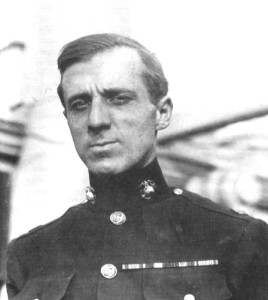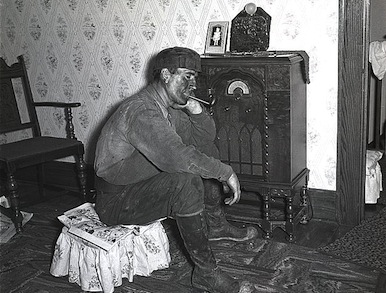The Power of the Isolationists Before World War II
Dan Bryan, February 9 2015
On most issues of the 1930s, Franklin Roosevelt enjoyed overwhelming support from Congress and the American people. It was this support which allowed him to enact his New Deal legislation and the Social Security program. One huge exception, however, was in the area of foreign policy. Fearing the rise of fascism and totalitarianism, Roosevelt consistently wanted the United States to become more involved in Europe in Japan. However, right up until the Pearl Harbor attacks the political will within in the United States was overwhelmingly against such intervention.
Therefore, foreign policy was one of the only areas of politics in which Roosevelt's popularity did not carry the day. But what were the objections to foreign engagement? What were the key motives of the isolationists and why was their support so broad? There were several influences which we now examine.
The Nye Committee, and the Legacy of World War I
Gerald Nye was an anti-war Senator from North Dakota who led a Committee from 1934 to 1936 which examined the American entry into World War I. The Nye Committee enjoyed strong support from a spectrum of Senators, ranging from Robert La Follette to Robert Taft. Arthur Vandenberg was a famous Senator who actually sat on the Committee. The Committee held 93 hearings and released a series of reports over the two-year period of its operation.
The Committee's (preordained) conclusions were that entry into World War I was unnecessary, that it had benefited large corporations and bankers at the expense of soldiers and the common man, and that Woodrow Wilson had withheld information from the American public when pushing for a war declaration. The Committee called out individual corporations that had profited from war. It also warned against the influence of similar forces in the 1930s. It even attempted to nationalize the American armaments industry to prevent further manipulations of public and political opinion.
Smedley Butler
Smedley Butler was a leading Marine Corps general of the 1910s and 20s who led a number of foreign interventions in the Americas, winning two separate Medals of Honor. This gave him a lot of popularity and credibility with the American public. After his retirement, Butler moved to the far-left politically. He denounced all of his interventions in speeches and finally with his book, War is a Racket.
Butler made the following allegations in regards to the U.S. intervention in World War I. In the isolationist environment of the 1930s they were hardly controversial.
- The World War produced 21,000 millionaires who profited from the armaments industry. None of them died in the trenches.
- The U.S. national debt in 1898, before the age of imperialism, was $1 billon. By the end of World War I this figure was $25 billion.
- The du Pont family, to take one example, averaged earnings of $6 million per year in the five years before World War I. During World War I they made $58 million per year.
- United States Steel -- average earnings of $105 million per year in the five years before World War I. During World War I they made $240 million per year.
- These two and numerous other companies made their profits by gouging the U.S. Government on contracts and deliveries.
- The biggest price, obviously, was paid by the dead soldiers who enjoyed no participation whatsoever in these profits.
- American banks, munitions makers, and corporations had collectively lent $5-6 billion to the Allies before 1917 to finance the war effort. Had the Allies lost, this money would have vanished. This explained the intervention and Wilson's about face more clearly than any other fact.
Butler also famously eulogized his own career as follows:
"I spent 33 years and four months in active military service and during that period I spent most of my time as a high class muscle man for Big Business, for Wall Street and the bankers. In short, I was a racketeer, a gangster for capitalism. I helped make Mexico and especially Tampico safe for American oil interests in 1914. I helped make Haiti and Cuba a decent place for the National City Bank boys to collect revenues in. I helped in the raping of half a dozen Central American republics for the benefit of Wall Street. I helped purify Nicaragua for the International Banking House of Brown Brothers in 1902–1912. I brought light to the Dominican Republic for the American sugar interests in 1916. I helped make Honduras right for the American fruit companies in 1903. In China in 1927 I helped see to it that Standard Oil went on its way unmolested. Looking back on it, I might have given Al Capone a few hints. The best he could do was to operate his racket in three districts. I operated on three continents."
Father Charles Coughlin
Another prominent personality in the 1930s political scene was Father Charles Coughlin. Coughlin was one of the first people to utilize the power of talk radio to build a national reputation. His show was nationally syndicated and listened to by millions of Americans at its peak.
Coughlin started out as a strong supporter of Franklin Roosevelt. Throughout 1932 he fulminated against America's business class and went to any lengths to praise the Democrats before that year's election. However, Coughlin continued to move to the political left as the 30s continued, breaking completely with Roosevelt in favor of politicians such as Huey Long. He started expressing anti-capitalist, anti-banker, anti-Wall Street, and anti-Semitic views on nearly all of his broadcasts. He blamed all of these influences for the American entry in World War I and warned that the same thing could happen again with the turmoil forming in Europe.
By the late 1930s Coughlin became more stridently anti-Semitic and even began to praise Nazi Germany. Large radio stations, particularly in urban centers like Chicago and New York, stopped airing his programming. This was in part due to pressure from the Roosevelt Administration. However, Coughlin's popularity was also on the decline by this point, due in large part to his increasingly bitter, disjointed rhetoric. Even so, for years he had served as a powerful American voice for isolationism.
Charles Lindbergh
After his flight from New York to Paris in 1927, Charles Lindbergh became one of the most famous and popular men in the United States. Throughout the 1930s he stayed in the limelight (sadly, partly through the tragic death of his infant son) and increasingly became an outspoken advocate of isolationism. Lindbergh was especially controversial due to his perceived closeness with Nazi Germany. He accepted a medal from that country in 1938 and was planning to move to Berlin as late as that year. It was only after the Kristallnacht incident that he decided against such action.
Even so, Lindbergh continued to tour America to large crowds, giving speeches and advocating for isolationism. One noteworthy speech took place in Des Moines on September 11, 1941, after the German invasion of the Soviet Union (listen here). Even at this late date Lindbergh implicated three groups for bringing America to war -- the British, the Jewish people, and the Roosevelt Administration.
The Neutrality Acts and The America First Committee
Politically, this animus drove the passage in Congress of a series of Neutrality Acts in the 1930s. These acts generally forbade the United States from selling arms to belligerent nations in a war, and also forbade U.S. citizens from traveling on belligerent ships.
Roosevelt despised the Neutrality Acts and believed them to be incredibly short-sighted in the context of Hitler's aggression, along with events in China. As the situation of the Allies in Europe continued to deteriorate, to the point that Great Britain remained the only opposition to Germany, he was able to push a change in policy through Congress. The Lend-Lease Act allowed the U.S. to lease military arms to Great Britain and other countries in return for future payment. Over 40 countries eventually received aid as a result of this act.
The Lend-Lease Act was a sign of shifting opinion, but it was not universally well-received. Neither were a series of Naval Expansion Acts, culminating with the Two-Ocean Navy Act in 1940. The America First Committee, formed in 1940, reacted strongly to this shift in policy. Peaking at 800,000 paid members, the Committee advocated for non-intervention all the way up through December of 1941, when it disbanded in the wake of Pearl Harbor. It enjoyed particularly strong support in the Midwest.
The Legacy of the Isolationist Movement
Most people would agree that the isolationist sentiment in the United States had grave consequences. It slowed down the potential reaction to Hitler's rise and led to the unnecessary deaths of millions in Europe and Asia. The isolationist stance became even further marginalized after World War II when the aggressive intentions of the Soviet Union became obvious. The penchant for virulent attacks on the Jewish people also discredited this movement completely in light of actual events in Europe.
Many people have also found it easier to point out the myopic excesses of the isolationists, rather than respond to valid criticisms of the intervention in World War I. While German submarine warfare was one aspect of this intervention, and perhaps a sufficient one, it was not the while story.
Many historians, out of fondness for Woodrow Wilson or respect for the business class, have little incentive to emphasize exactly how corrupt the World War I effort was in practice. By ignoring these criticisms, we not only misunderstand an essential aspect of the isolationist position but also miss out on important lessons about the synergy of government and big business. For even within the democratic system, the potential for pilferage and boondoggles is enormous when both sides of the government/business equation stand to benefit.
Recommendations/Sources
- Lynne Olson - Those Angry Days: Roosevelt, Lindbergh, and America's Fight Over World War II, 1939-1941
- Justus D. Doenecke, John E. Wilz - From Isolation to War: 1931 - 1941
- David Reynolds - The Long Shadow: The Legacies of the Great War in the Twentieth Century
- Hans Schmidt - Maverick Marine: General Smedley D. Butler and the Contradictions of American Military History
- Donald Warren - Radio Priest: Charles Coughlin, The Father of Hate Radio



